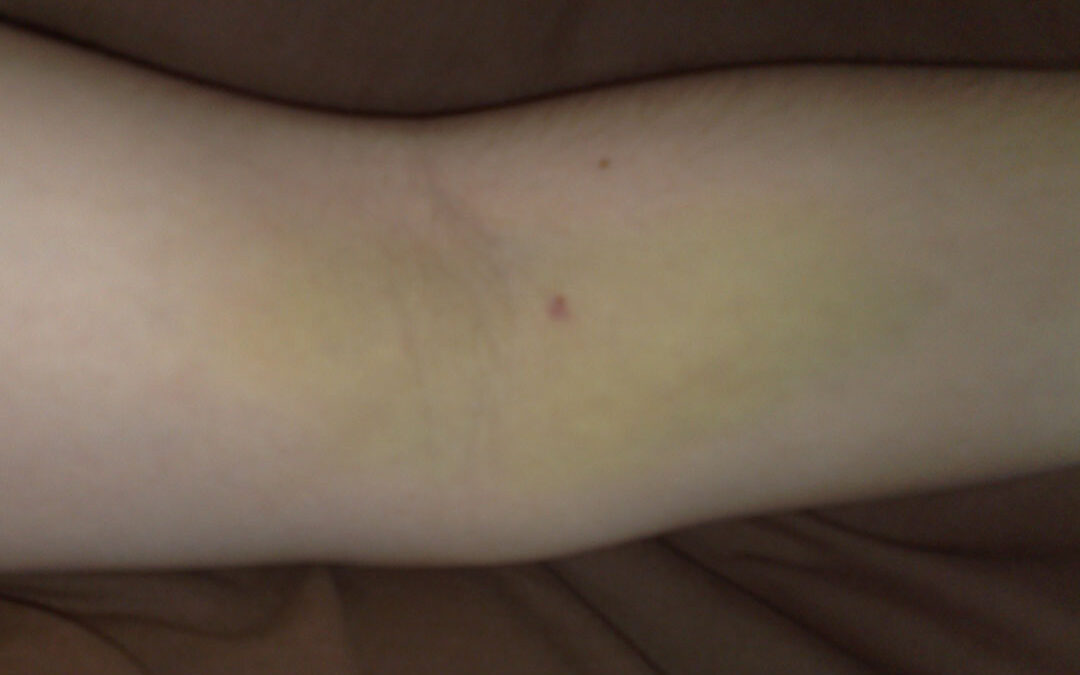You may have a bruise if you recently sustained an injury (or several). Depending on where they are and how big they are, bruises have several names.
Other terms for bruises include Contusion, Hematoma, and Ecchymosis.
Initially, bruises are sensitive and painful. You might feel some strange feelings as they recover.
The most typical is itchy skin. Here’s all you need to know about why bruises itch and how to treat them if you have one.
KEY TAKEAWAYS
✅ If your bruise is itching, it means it’s healing.
✅ Moisturizers, Antihistamines, steroid creams, and lighter clothing can help.
✅ Some bruises are more serious than others.
✅ A bruise should go away after two weeks.
The Bruise, What is it?
An example of a wound is a bruise. A bruise develops when a region of the body is traumatized in a way that tears blood vessels but leaves the skin intact. Blood escapes from the broken vessels and becomes entrapped under the skin, in the muscles, or in the bone.
Although you can’t always see them, bruises are usually uncomfortable. Bruises that develop over bones are invisible. However, the ache from where the bruise developed is still present. However, if a bruise appears closer to the skin’s surface, the trapped blood can be seen through the skin.
The body immediately begins the process of destroying trapped blood cells. A bruise can still take up to two weeks to completely heal. You’ll notice that the pain and swelling lessen as the bruise heals. You can also observe the bruise’s gradual color shift if you can see it.
The bruise will initially seem red or blue. But it will start to seem darker brown after a few days. It appears greenish or yellow-brown after a week. After that, it gradually becomes lighter and lighter colors of yellow before going away entirely.
What causes some bruises to itch?
There is an adage that states, “If itches, it must be healing.” The majority of wounds itch as they recover, and bruises are no different. Why bruises (or other wounds) itch as they heal is not totally apparent.
Numerous factors, according to researchers, are at play:
- Histamine: The chemical histamine causes the itch reaction. Histamine is to blame if you’ve ever experienced itching due to hives or allergies. Histamine is released by the immune system in reaction to all stresses, including wounds.
- Bilirubin: As red blood cells degrade, bilirubin, a waste product, is released. The itch reaction is brought on by bilirubin.
- The size of the wound: According to some studies, larger bruises (and wounds) have a higher likelihood of itching than smaller ones. This is most likely a result of larger wounds putting greater strain and inflammation on the body. The immune system is prompted by this to release substances that cause itching.
- Nerve stimulation: Nerves generate substances that can cause skin itching while wounds heal.
How do you get bruising to stop itching?
Itching is unpleasant and can interfere with daily tasks like sleeping. It is much simpler to say than to do to resist the impulse to scratch. However, there are several items that can reduce (or even eliminate) your itching, such as:
- Moisturizers: Your skin will itch more if it is dry. Keeping your skin hydrated reduces irritation and moisture loss. If you dislike creams, consider taking an oatmeal bath. You can switch to less-drying soaps and cleansers.
- Wearing lighter clothing: Heat appears to aggravate irritation. Keeping cold can help you stop itching. You can use lighter clothing instead of wool even when you can’t control the weather. When taking a shower or bath, you can also use lukewarm water. Additionally, if you use moisturizer, try cooling it down in the refrigerator for added relief.
- Antihistamines: These drugs can reduce itching. You could experience sleepiness from older antihistamines like diphenhydramine (Benadryl). If you have trouble going to sleep because of itching, that could be a benefit. Try more recent antihistamines like loratadine if you require something that won’t put you to sleep, or choose an antihistamine cream that you may apply straight to the bruise.
- Steroid cream: These creams have the ability to reduce inflammation. Preventing your immunological reaction from generating histamine, helps lessen itching.
Creams for pain relief that contain menthol give a cooling feeling that might help with itching relief. Skin nerves that provide itch signals to the brain are desensitized by topical capsaicin. If nothing else works, your doctor can advise using lidocaine patches or topical numbing lotions.
Skin infections can develop if you scratch a bruise or open a wound. It is also possible to scrape so forcefully that further bruising results. Therefore, controlling your itch might hasten the healing of your bruise.
When should you visit a doctor to have your bruise examined?
Small bruising ought to disappear on its own. However, bruises may occasionally indicate a more serious medical issue. If a bruise is spreading or doesn’t start to fade after a week, consult your healthcare physician.
Bruises form as a result of injuries, thus they shouldn’t just occur. Consult a medical professional straight away if you’re getting bruises but can’t remember getting hurt. This can indicate a blood condition.
In conclusion
An example of a wound is a bruise. Additionally, itching while a lesion is healing is common for all wounds, including bruises. After one to two weeks, a bruise should go away. You can try topical steroids, antihistamines, and moisturizers in the interim to stop itching.
